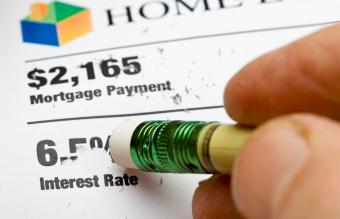
In a mortgage assumption, a buyer takes over, or "assumes", the seller's current mortgage agreement. There are both potential risks and benefits to assumptions.
Basic Facts About Mortgage Assumptions
There are two main types of mortgage assumptions: informal and formal. An informal assumption does not involve the mortgagor's approval and is generally prohibited in most private mortgage loan contracts, yet may nevertheless occur. In a formal assumption, the lender has given approval for the transaction after investigating the buyer's credit score and ability to pay for the loan. Typically, only some FHA and VA loans are formally assumable.
Transfer of Ownership
An assumption in which the lender is notified of and gives approval for the assumption formally removes the seller from any legal obligation to fulfill the loan requirements. This may be beneficial to sellers who are unable to sell their home through a traditional sale, possibly due to a recession or another factor.
Loan Qualification
In an assumption, a buyer must still qualify for the loan by applying for and meeting all loan requirements as if the loan were not yet in existence. The buyer could find their application rejected by the lender, meaning no assumption can occur. This leaves the buyer with the options of walking away from the deal or entering into an informal assumption and accepting all the risks that brings.
Interest Rate Considerations
The interest rate in place can have a huge impact on whether a mortgage assumption makes sense or not.
Lower Interest Rates
For example, in January 2012, the average rate on a 30-year fixed loan was 3.92%, while today it is 4.42%. A $250,000 mortgage at 3.92% has an approximately $1,182 monthly payment, while that same amount at 4.42% has a $1,254 payment. By assuming the mortgage at the lower interest rate, the buyer saves about $72 per month.
Higher Interest Rates
Just as it's possible for a buyer to obtain a lower interest rate than current rates, it is also possible to acquire a higher-than-current interest rate when assuming a mortgage. For example, the average rate on a 30-year fixed mortgage acquired in January 2003 was 5.92%. The average rate in October of 2013 is 4.42%. A buyer that assumes a $250,000 loan at 5.92% pays about $1,486 per month, which is $232 higher than the $1,254 monthly payment on a 4.42% rate loan.
Assuming an Adjustable Rate Mortgage (ARM)
Although normally a buyer can obtain a lower interest rate by assuming a loan, that really only applies if it's a fixed-rate mortgage. A buyer who assumes an ARM may face higher-than-current interest rates in the future, which could significantly affect any savings accrued through the assumption.
For example, assuming a $250,000 mortgage with a 4% interest rate means that the buyer pays approximately $1,193 per month. However, if that rate is to jump a percentage point in a year, that monthly payment jumps to about $1,342. That's a $149 per month increase for the remainder of the life of the loan, or until rates change again.
Closing Costs
According to SFGate, a benefit to mortgage assumption is needing to pay lower closing costs. The buyer usually also pays less closing costs because there is technically no new mortgage to close. No new mortgage means no settlement costs. For example, an assumption normally does not require an appraisal, which can cost around $400-$500, eliminating the need to pay that expense at settlement time.
When Assumptions Work
There are a few circumstances in which a mortgage assumption might be a good idea:
Foreclosure
HGTV's Front Door states that a mortgage assumption might not be a bad idea if a buyer can purchase the home before it enters foreclosure, giving the buyer a new home and allowing the seller to avoid foreclosure. This option might be particularly beneficial when the seller's equity is low.
Credit Issues
A bad credit score and low down payment amount usually disqualifies a buyer from obtaining a mortgage. Assuming a mortgage may make a buyer able to purchase a home when otherwise unable.
Shorter Amortization
Assuming a mortgage means that the buyer takes off the remaining length of time on the loan. This could mean that the buyer has significantly less time before owning the house outright. This could especially benefit elderly buyers.
For example, assuming a 30-year fixed mortgage when a seller has already paid the first 20 years of the loan means that the buyer only has 10 years of payments remaining prior to fully owning the home with no mortgage obligation.
Little Equity
Typically, a buyer has found a good deal when they will pay no more than 20% of the purchase price of the home to the seller. Additionally, Veterans United recommends a mortgage assumption when the buyer does not need to take out a second mortgage to pay the seller's equity amount. This is because a second mortgage can raise the price of the purchase to be equal with the day's interest rate.
For example, if the mortgage to be assumed has a 2.5% interest rate and the second mortgage taken out to pay the equity to the seller has a 3.0% interest rate, the total rate on these two mortgages - 5.5% - can be effectively higher than the current interest rate on a new mortgage (as of October 2013, 4.42%). The result is that the seller doesn't actually save money by assuming the mortgage.
Low Interest Rate
Fox Business states that an assumption might be a good idea when a buyer can obtain a mortgage at an interest rate that is lower than current rates. This means the buyer gets a better deal on the house and saves money in the long run.
For example, if the seller obtained a 2.25% rate on a 30-year fixed mortgage at the time the house was purchased, and current rates are 4.42%, the seller effectively obtains a rate 2.19% lower than the day's rate. For a $250,000 mortgage, a 4.42% interest rate leads to a monthly payment of $1,254.86; however, for this same mortgage, a 2.25% rate results in a monthly payment of $955.62. In this scenario, the buyer saves $290.24 every month.
Deciding to Participate in an Assumption
Mortgage assumptions aren't for everyone and might not have the financial gains that buyer and seller seek. Thoroughly investigate the mortgage terms and requirements prior to entering into a mortgage assumption agreement.







